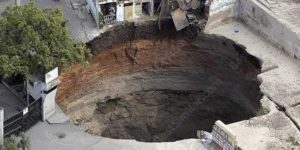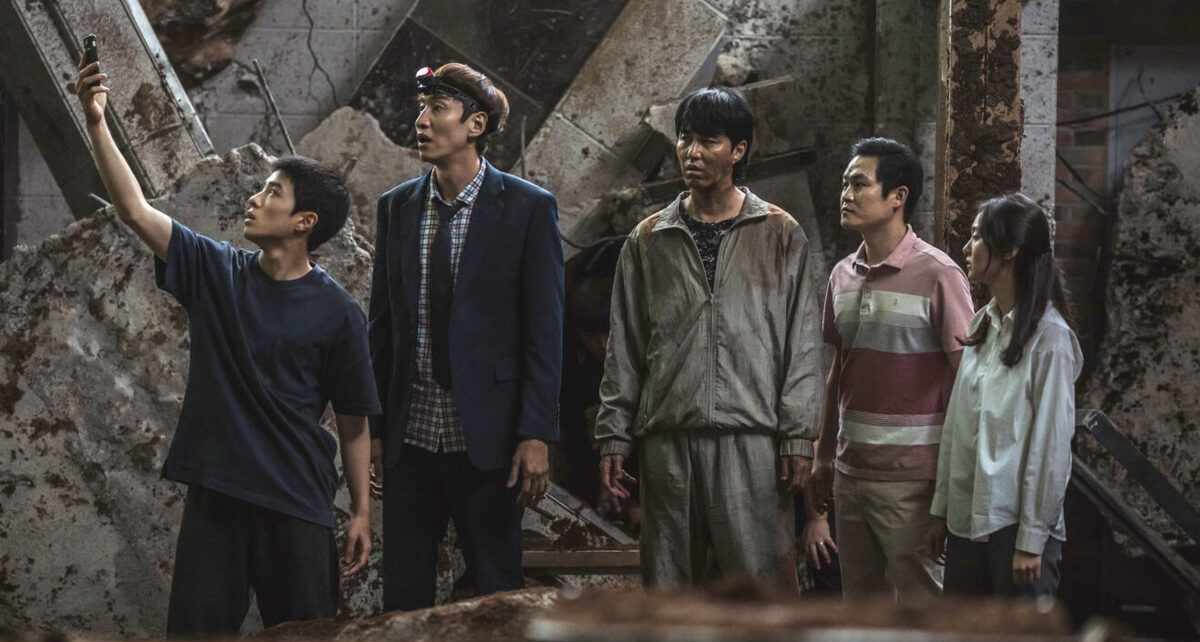It is very unlikely the producers of today’s film accounted for the Surfside condominium collapse. After all, the Surfside is not only half-a-world away from South Korea, it collapsed on June 24; Sinkhole was released to audiences in August. In movie production terms, that is a blink, a cut, half-a-scene, tops. And still, one can’t help wondering how ironically fortunate or teeth-grindingly cringe-y it is for a disaster film about a collapsed apartment building to follow right after the real life collapse of an apartment building. Weird, huh?
Few films will make you question homeowners insurance practices in South Korea. Thank goodness some do, because this is something I really wish to know…if you live in Seoul and your owned property sinks 500 M below ground level, do you have any recourse? Will insurance compensate? Will the government compensate? If a new condo is built on that property, are you automatically entitled to a share? i.e. Do you own the air? Like if your place was on level three, do you own the space where your apartment would be if something ever gets built there again … or do you now only own the space 500 M down? Well, these are all post-mortem questions. The film is about a Sinkhole.
Park Dong-won (Kim Sung-kyun) isn’t exactly a hero. He’d be the first to tell you he saved up for ten years to buy a condo in the iffy part of town and you get the feeling that he complained an awful lot in the process. The very day he moves in, Park is challenged by an insensitive neighbor, Jung Man-soo (Cha Seung-won), the dude who leaves his ride in the building loading zone all day and then disappears.
After that, the joke is that Park can’t NOT see Jung. The building nemesis is at the gym, in the market, in the parking lot, in his condo; Jung is even the guy who comes when Park needs an Uber. Turns out, Park is a single father and –struggling for cash- needs to wear many hats to keep his own life afloat, so naturally he balked at evidence the building is falling apart because that would mean an investment in time and money that he doesn’t have.
But the building is falling apart. Wait. That’s not quite right. The ground beneath the building is falling apart. And  beneath that ground is a conveniently building-sized hole 500 M deep. Hope nobody is in the building when the ground gives way.
beneath that ground is a conveniently building-sized hole 500 M deep. Hope nobody is in the building when the ground gives way.
So you see what this is, right? The movie gives us some mildly likable mediocrities and asks them to step up when heroics are required. Basically, you take The Poseidon Adventure and set it in a South Korean apartment building, and it amounts to about the same thing. The only questions in my mind are whether or not the producers knew about the Surfside collapse when they released the film AND –if they did know- did they restructure the release in any way for greater sensitivity to a similar real life disaster that took 98 lives?
Sinkhole is watchable if mildly generic disaster fare. I can’t say I’ll remember the players very long, but I will remember an entire building going South the hard way for some time. If you believe in the disaster film scenario, this should be right up your alley … well, at least until the building and that particular alley sink into Middle Earth.
Now it’s not like there’s money you stole
Or filled stocking with Christmas coal
But angels be wary
And don’t ignore the scary
When you request investment in your “Sinkhole”
Not Rated, 117 Minutes
Director: Ji-hoon Kim
Writer: Cheol-Hong Jeon
Genre: Holes
Type of being most likely to enjoy this film: Poseidon adventurers
Type of being least likely to enjoy this film: Building supers



